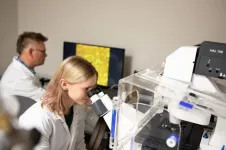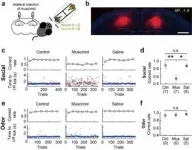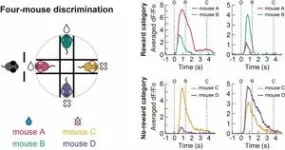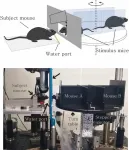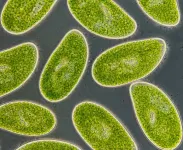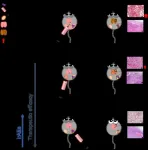(Press-News.org) Since 2000, sexually transmitted infection rates have been on the rise. Syphilis, a disease that was nearly eradicated in the United States at that time, now affects more than 18 million people worldwide each year with few options for effective treatment.
One challenge that has plagued syphilis researchers for decades was the inability to culture and study the disease-causing agent in a laboratory setting.
“The incredible efforts of our colleagues and collaborators produced a faithful system to propagate the disease-causing agent in vitro, or in a laboratory setting. Being able to culture the bacterium opens new doors in terms of understanding it in terms of how it causes disease, ways we can prevent infection, and in efforts in which we may be able to intervene,” said Brandon Jutras, the principal investigator of the project, an assistant professor of biochemistry in the College of Agriculture and Life Sciences, and affiliated faculty of the Fralin Life Sciences Institute and the Center for Emerging, Zoonotic, and Arthropod-borne Pathogens.
Virginia Tech researchers set out to determine if there were possible treatment options that could serve as an alternative for the millions of people impacted by the disease each year.
What the College of Agriculture and Life Sciences researchers discovered exceeded all expectations. Not only did they find another treatment option to benzathine penicillin G, but they found two antimicrobial agents that were more effective in treating the disease-causing agent Treponema pallidum in a laboratory setting.
The research was published today in “Antimicrobial and Resistance,” a newcomer to the Nature Portfolio Journals, and was funded by the National Institutes of Health and the U.S. Department of Agriculture with additional internal funding from the Center of Emerging, Zoonotic, and Arthropod-borne Diseases.
A fluorescent image of Treponema pallidum in a laboratory setting.
These drugs are already approved by the Food and Drug Administration, so they are safe for humans, which could accelerate the rollout.
“It’s a disease for which we have very few therapeutic options,” said Kathryn Hayes, the lead author and Ph.D. candidate in Virginia Tech’s Translational Biology, Medicine, and Health program. “We were able to do the first large-scale drug screen for syphilis treatment alternatives, efforts that would not have been possible without an in vitro culture system.”
Now, hear directly from the researchers on their project:
What inspired you to carry out this research?
Hayes: I have a huge passion for sexual health and a nerdy interest in infectious diseases. This research allowed me to combine these two interests as syphilis is a disease that has been around for centuries but little is known about it due to the difficulty of growing the bacteria in a lab setting. Having more data and research on the disease is a pressing clinical need.
What spurred your interest in sexual health?
Hayes: My own queer identity and how disproportionally impacted the queer community is by sexually transmitted diseases motivated me. The other is the stigma around sexually transmitted infections [STIs]. People will talk about how they have the flu, or even COVID-19, but no one will say they have syphilis. Education, or lack thereof, around sexual health, particularly STIs, has impacted how people talk about it and has continued to reinforce the importance of this research.
The research team of Kathryn Hayes and Brandon Jutras found two antimicrobial agents that were more effective in treating the syphilis disease-causing agent Treponema pallidum in a laboratory setting. Photo by Max Esterhuizen for Virginia Tech.
A year and 100 days: Can you describe the process you used to culture syphilis?
Hayes: The reason it is so hard is that the bacteria require very strict microaerophilic conditions – a low oxygen environment – which, in this case, means exactly 1.5 percent oxygen. We have an incubator that uses nitrogen to force out the excess oxygen so it keeps that exact percentage. The day before I culture, I take a supportive mammalian cell line and put it onto traditional plates, because they still need a co-culture to support growth. I have to make fresh media for the culture myself.
We have a few components that I make quarterly, and then every week I have to combine 12 ingredients to make the media, which then have to equilibrate overnight in our special incubator.
On average it was a two-hour prep the day before at minimum and then anywhere from like three to seven hours the day of depending on the number of bacteria I'm working with in that culture. As of last week, it has been a year and 100 days of culturing.
How did you conduct the drug screening?
Jutras: We started with nearly 100 antibiotics of a particular class, and two tetracyclines, which are in a different class of antibiotic, used as a cross-comparison. We incubated the bacteria with the antibiotics at an extraordinarily low concentration (five nanomolar) to get an initial reading of how effective they were at preventing growth.
From there, we took our top 25 percent of compounds and retested them to ensure that our analytical methods were accurate.
The top 10 percent were further investigated using sophisticated microscopy techniques in conjunction with antibiotic treatment. In essence, we could watch these compounds in action
In addition, we determined their minimum inhibitory concentrations, and that's where we further confirmed that new candidates Azlocillin and Mezlocillin were more effective than our current standard of care, in vitro.
This research could have major implications. What’s next in the process for you?
Jutras: This project was a big risk. Addie could spend all this time and perform all this incredible research just to have discovered that nothing worked better than benzathine penicillin G. The surprising thing is that she found multiple options that work better.
Hayes: I want to look at modeling how these antibiotics are affecting bacteria. So, looking at protein drug interaction and how those interactions affect overall drug efficacy. I think that's a very interesting mechanistic step because once you understand what's happening to the bacteria on a molecular level, you can synthesize compounds that are very similar, but slightly different, to create more effective treatments.
END
Q&A: Virginia Tech researchers discover new, more effective candidates for treatment of syphilis
Researchers found two antimicrobial agents that were more effective in treating the disease-causing agent Treponema pallidum in a laboratory setting
2023-06-01
ELSE PRESS RELEASES FROM THIS DATE:
Discovery of neurons that recognize others
2023-06-01
Researchers from the Center for Cognition and Sociality (CCS) within the Institute for Basic Science (IBS) recently announced the discovery of neurons that allow us to recognize others. The research team discovered that the neurons that deal with the information associated with different individuals are located in the CA1 region of the hippocampus.
Social animals, including humans, constantly engage in interactions with others. In this process, the ability to recognize the identity of the social counterpart, retrieve relevant information about them from memory, ...
Little-known microbes could help predict climate tipping points
2023-06-01
DURHAM, N.C. -- Researchers studying a group of widespread but often overlooked microbes have identified a climate feedback loop that could accelerate climate change. But it’s not all bad news: this one comes with an early warning signal.
Using a computer simulation, a team of scientists from Duke University and the University of California, Santa Barbara, showed that most of the world’s ocean plankton and many other single-celled creatures in lakes, peatlands and other ecosystems could cross a threshold where instead of soaking up carbon dioxide, they start doing the opposite. That’s because of how warming affects their metabolism.
Because carbon dioxide ...
Makers of PFAS ‘forever chemicals’ covered up the dangers
2023-06-01
The chemical industry took a page out of the tobacco playbook when they discovered and suppressed their knowledge of health harms caused by exposure to PFAS (per- and polyfluoroalkyl substances), according to an analysis of previously secret industry documents by UC San Francisco (UCSF) researchers.
A new paper published May 31, 2023, in Annals of Global Health, examines documents from DuPont and 3M, the largest manufacturers of PFAS, and analyzes the tactics industry used to delay public awareness of PFAS toxicity and, in turn, delay regulations governing their use. PFAS are widely used chemicals in clothing, ...
Antipsychotic drugs use increased in Canadian long-term care homes in first year of pandemic
2023-06-01
While most aspects of care quality in long-term care homes did not differ in the first year of the pandemic from pre-pandemic levels, a new study shows that the use of antipsychotic drugs increased in all provinces.
The study analyzed health system performance reports provided by the Canadian Institute for Health Information (CIHI) over three years: two before the pandemic and the first year of COVID-19. The reports are based on more than half a million resident assessments completed in Ontario, Manitoba, Alberta and British Columbia.
Researchers ...
Northsiders are more connected to nature than southsiders: study
2023-06-01
New research into Melburnians’ connection to nature is helping the City of Melbourne understand how to engage its community members in conservation efforts.
The study, led by RMIT University in collaboration with the City of Melbourne and Queensland University of Technology, surveyed over 1,500 City of Melbourne residents and visitors on their connection to nature and found nearly 75% of respondents had a high connection to nature.
More than 75% of respondents said they were concerned about climate change and the destruction of nature.
However, retirees and university students who have lived most of their lives in the Melbourne ...
Preventing truck crashes needs to take ‘dashcam’ approach to driver ‘microsleeps’
2023-06-01
Researchers using dashcam footage of real-world collisions involving large trucks to analyze driver and vehicle behavior has found that anti-drowsiness alarms or similar technologies to prevent falling asleep at the wheel need to go beyond a focus on monitoring the drivers’ eyes, and consider other microsleep behaviors including a relaxation of back and neck muscles and abnormal activity of the vehicle itself.
A study reporting the researchers’ findings was published April 13 in the ...
Improving immune checkpoint inhibitors’ anti-tumor response and minimizing side effects
2023-06-01
Scientists at Tohoku University have discovered a novel approach that improves the efficacy of immune checkpoint blockade (ICB) - a novel form of cancer treatment utilizing immune checkpoint inhibitors (ICIs) - and minimizes the associated side effects. They demonstrated that using ICIs to target tumor-positive lymph nodes generates a robust anti-tumor response against both local and systemic metastases.
The study was published in the Journal of Experimental and Clinical Cancer Research on June 1, 2023.
Our immune system uses “checkpoint proteins” to regulate and control the activity of immune cells. But cancer ...
Taxane-induced peripheral neuropathy in breast cancer: Frequent, clinically significant, and worse with paclitaxel
2023-06-01
Chemotherapy-induced peripheral neuropathy (CIPN) – nerve pain, tingling, or numbness in the hands or feet – is a common side effect of certain cancer treatments, including two drugs frequently used to treat cancer – the taxanes paclitaxel and docetaxel. Initial results from a large study that tracked CIPN in more than 1,100 patients treated for breast cancer with a taxane show a pattern of clinically meaningful, persistent sensory and motor symptoms, with patients experiencing more severe symptoms with paclitaxel than with docetaxel.
These initial results from the SWOG S1714 clinical trial are being reported in an oral presentation at the 2023 annual ...
DOE announces $46 million for commercial fusion energy development
2023-06-01
WASHINGTON, D.C.—The U.S. Department of Energy (DOE) today announced $46 million in funding to eight companies advancing designs and research and development for fusion power plants, representing a major step in President Biden’s commitment to a pilot-scale demonstration of fusion within a decade. Fusion reactions power the stars, and research is underway to make fusion energy production on Earth possible, providing an abundant, inherently safe, non-carbon-emitting energy source for the planet. This funding from the Milestone-Based ...
More than 1 in 6 unvaccinated people report health effects of COVID two years after confirmed infection
2023-06-01
Around 1 in 6 unvaccinated individuals say they are still experiencing health effects of covid-19 up to two years after infection, finds a study from Switzerland published by The BMJ today.
The findings show that 17% of participants did not return to normal health and 18% reported covid-19 related symptoms 24 months after initial infection.
Most people who have covid-19 recover soon after the initial phase of the disease, but others experience persistent health problems (known as long covid), which can impact quality of life ...
LAST 30 PRESS RELEASES:
Deforestation in the Amazon raises the surface temperature by 3 °C during the dry season
Model more accurately maps the impact of frost on corn crops
How did humans develop sharp vision? Lab-grown retinas show likely answer
Sour grapes? Taste, experience of sour foods depends on individual consumer
At AAAS, professor Krystal Tsosie argues the future of science must be Indigenous-led
From the lab to the living room: Decoding Parkinson’s patients movements in the real world
Research advances in porous materials, as highlighted in the 2025 Nobel Prize in Chemistry
Sally C. Morton, executive vice president of ASU Knowledge Enterprise, presents a bold and practical framework for moving research from discovery to real-world impact
Biochemical parameters in patients with diabetic nephropathy versus individuals with diabetes alone, non-diabetic nephropathy, and healthy controls
Muscular strength and mortality in women ages 63 to 99
Adolescent and young adult requests for medication abortion through online telemedicine
Researchers want a better whiff of plant-based proteins
Pioneering a new generation of lithium battery cathode materials
A Pitt-Johnstown professor found syntax in the warbling duets of wild parrots
Cleaner solar manufacturing could cut global emissions by eight billion tonnes
Safety and efficacy of stereoelectroencephalography-guided resection and responsive neurostimulation in drug-resistant temporal lobe epilepsy
Assessing safety and gender-based variations in cardiac pacemakers and related devices
New study reveals how a key receptor tells apart two nearly identical drug molecules
Parkinson’s disease triggers a hidden shift in how the body produces energy
Eleven genetic variants affect gut microbiome
Study creates most precise map yet of agricultural emissions, charts path to reduce hotspots
When heat flows like water
Study confirms Arctic peatlands are expanding
KRICT develops microfluidic chip for one-step detection of PFAs and other pollutants
How much can an autonomous robotic arm feel like part of the body
Cell and gene therapy across 35 years
Rapid microwave method creates high performance carbon material for carbon dioxide capture
New fluorescent strategy could unlock the hidden life cycle of microplastics inside living organisms
HKUST develops novel calcium-ion battery technology enhancing energy storage efficiency and sustainability
High-risk pregnancy specialists present research on AI models that could predict pregnancy complications
[Press-News.org] Q&A: Virginia Tech researchers discover new, more effective candidates for treatment of syphilisResearchers found two antimicrobial agents that were more effective in treating the disease-causing agent Treponema pallidum in a laboratory setting
